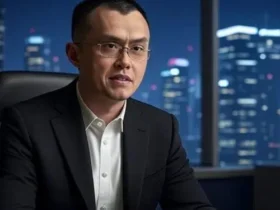The writer highlights bitcoin as “absolute property, something that cannot be taken away.”
De María believes that privacy is not about laws, but about maintaining control over our data.
As part of the first day of the Watch Out! conference Bitcoin 2025, CriptoNoticias had the opportunity to talk with Álvaro de María, author of The Bitcoin Philosophy. During the talk, de María addressed topics such as the influence of BTC in American politics and its potential to transform the relationship between citizens and States.
One of the central topics of the conversation was the relationship between bitcoin and political power. Álvaro highlighted how Satoshi Nakamoto’s creation grants significant bargaining power to those who treasure it, allowing them to influence politics through donations and support for candidates.
In this way, the specialist stated that, when bitcoiners can financially support the candidates who support their interests, the relationship between society and the upper echelons of power begins to transform. De María placed emphasis on the way in which the last candidates for the US presidency started their campaigns early, something that seemed very fast considering the years that BTC has been in circulation.
Then, The author highlighted the differences between political profiles that are related to bitcoinnoting that while Robert Kennedy Jr. has a deep and detailed knowledge of cryptocurrency, Donald Trump takes an approach that in his view is more negotiation-oriented.
«Robert Kennedy Jr. is truly an excellent expert on bitcoin. Excellent, really. He has everything very clear, he understands it very well. “He is probably the politician who understands it best in the world,” said Álvaro.
The writer added that, in contrast to Kennedy, Trump attended the conference primarily as a public event and after receiving significant donations, showing a more strategic interest rather than one focused on deep knowledge.
On the other hand, a comparison was made between the current economic situation and the moment when power passed from the aristocrats to the bourgeoisie during the Middle Ages, and the currency stopped being honor and became money. Similarly, it was suggested that bitcoiners could be transforming the distribution of economic and social power currently.
On this point, Álvaro de María pointed out: «Bitcoin completely channels the change in negotiating power that we have. “I think we will see it reflected in all areas, and it also significantly impacts politics.”
About privacy and the philosophy of bitcoin


Another important aspect of the interview was confidentiality. When mentioned about the ban on Central Bank Digital Currencies (CBDC) in the United States, a fact that was reported by CriptoNoticias in January, De María stated that privacy does not consist of external regulations or laws that protect our data, but rather having personal control over it.
That is, each individual decides what information they share, what they keep hidden, and how it is used, without depending on others to respect rules. “I think this is the next battle we are going to have to fight,” he explained.
Likewise, the specialist delved even further into the impact of BTC on the relationship between citizens and the State, highlighting its potential as a form of absolute property capable of limiting state sovereignty.
Bitcoin is 16 years old. Any historical change has taken a couple of centuries. Between the time the communist manifesto was written and there was a communist government in a country, 69 years passed. Although it is getting faster thanks to the Internet and how we communicate, I think that is going to speed up many things.
Álvaro de María, author of “The Philosophy of Bitcoin”.
He also added: «The novelty of bitcoin is that it is absolute property, a property that cannot be taken away. That’s very strong. So strong that the theorist of the State himself, in chapter 29 of Leviathan, speaks of the causes that tend to the dissolution of the State. And he says, if citizens have absolute ownership of their property, the State disappears.
When Álvaro de María mentions “Leviathan”, he is referring to the idea of the philosopher Thomas Hobbes: that The State needs some control over assets and society to exist. Bitcoin, by allowing individuals to have complete ownership of their wealth without state intervention, is seen as a power that, in theory, reduces the government’s ability to control its citizens, something Hobbes considers fundamental to the survival of Leviathan.
In this way, Álvaro believes that “bitcoin puts us on the same level as the State”, offering individuals the ability to negotiate directly with institutions and redefine traditional power structures.
The interview concluded with the invitation to closely follow the author’s work in his new book Micropoliswhich delves into these ideas and proposes a vision of autonomous and distributed political communities thanks to Bitcoin technology.






Leave a Reply